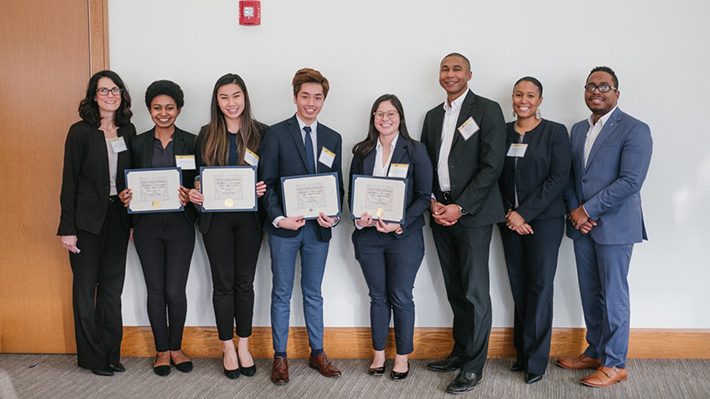Philadelphia or Pittsburgh: Which City Should I Choose?

Pennsylvania’s two major cities—Philadelphia and Pittsburgh—are key geographic connectors and historical seats of political and economic influence in the U.S. These two urban centers have much to offer those moving to the next stage of their career. In this installment of Which City Should I Choose? we compare Philadelphia and Pittsburgh so you can decide which city is a better fit for you.
Continue reading…The Top 5 MBA Grad Salaries in Pennsylvania

Where should you earn your MBA in Pennsylvania if you want to walk away with a high salary upon graduation? We’re breaking down the top five MBA programs for high salaries in Pennsylvania: Wharton, Tepper, Smeal, Katz, and LeBow.
Continue reading…Should You Get an MBA in Philadelphia or Baltimore?

The Mid-Atlantic region remains a major destination for education, work, and living. The most densely populated region in the U.S., the Mid-Atlantic is home to a third of the 100 highest-income cities and some of the most esteemed universities in the world.
Continue reading…Drexel LeBow MBA Admissions Answers 5 Questions

In our latest installment of the MetroMBA “5 Questions” series, we speak with Kate Sonstein, Associate Director of Graduate Recruitment & Admissions at the Drexel University Lebow College of Business. Sonstein discusses the importance of experiential learning and the quality of the students, staff, and faculty at LeBow.
1. What advice would you give an MBA candidate interested in Drexel LeBow?

“There are so many great things to think about when coming back to get your MBA, and sometimes it can be overwhelming. My best advice includes two simple things: be yourself and put your best foot forward on your application.
It’s important that you’re true to your personality and qualities in the admissions process because you are looking for an MBA that is the best fit for you, not your friend or colleague. You are on a search to find a home for the next 1.5-2 years of your life, and it is important that the MBA you select meets your individual needs at an academic, personal, and professional level. Otherwise, you could end up with a program that does not provide the type of interaction that is the best fit for you.
You also need to gain an understanding of the program and school where you are applying and demonstrate that in your essay and communications. Don’t just Google a few classes and stick them in your essay—believe me, we can tell. Big tip: spell check everything! And make sure your recommenders know why you are applying so they can write you an impactful letter. The best applications are those that are unique and showcase your strongest qualities, but also those that are genuine.”
2. What is Drexel LeBow’s greatest asset and what do you wish MBA students knew more about?
“Drexel LeBow is a community of ambitious, hard-working people who are striving to be the brightest and the best in their field. At Drexel LeBow, we are your greatest asset—our faculty, both with high impact research and industry collaboration; our staff, including our experienced career services team and involved college leadership; our advisors, guiding you through your experience every step of the way; and our students, go-getters always striving to be the best in every aspect of their experience.
I think our MBAs are still learning more about our newest feature in the curriculum: graduate minors. Graduate minors at Drexel are an opportunity to build an additional functional area of study at the graduate level through courses offered in other subject areas. Minors are offered across the university in over 50 different disciplines including data science, health administration, project management, and business analytics management. Minors can be built into the Drexel LeBow MBA plan of study without any additional courses—students simply put their 18 free elective credits towards their minor.”
3. What opportunities, outside of the classroom, does LeBow offer MBA students to get hands-on experience?

“Hands-on experience is crucial to the graduate experience, particularly in an MBA program. At LeBow, both our full-time and part-time students have the opportunity to participate in experiential learning opportunities, regardless of what other commitments they manage outside the classroom.
Consulting courses and projects are a key aspect of experiential learning at LeBow. Our students work with many industry partners through our Business Solutions Institute to solve complex business problems, working with decision makers and company leadership alike. Students can opt to work with a for-profit or not-for-profit company in a consulting course, or work on a consulting project through the Institute.
LeBow also offers the opportunity for residency-based courses, both domestically at one of our two Pennsylvania campuses or internationally. Domestic residencies are offered based on topical learning, such as Six Sigma or Negotiations for Leaders, or as a consulting course option. Our international residency course includes 10 weeks of study about a specific foreign market, and then concludes with a trip to that country (or countries) in the last week of term.”
4. How does LeBow support its MBA students for post-graduation?
“Throughout the MBA experience, our Graduate Career Services Team works closely with all our MBAs, regardless of their specific career goals. Opportunities including workshops, one-on-one coaching, and industry engagement events are integral to the MBA experience.
As an alumnus, we also strongly encourage involvement and engagement with the College and our current students. In addition to our University and College level alumni groups, we have the Drexel LeBow Graduate Alumni Association for our MS and MBA alumni that is quite active. The group hosts a number of events each year, including our signature night of Alumni Networking each April.
Alumni also have lifetime access to our Graduate Career Services Team. The team consists of a variety of professionals with different backgrounds and expertise who are available as they transition to multiple roles throughout their career, or simply for professional development advice and feedback. We encourage our alumni to be as involved as possible—it’s all about who you know!”
5. What’s your favorite online blog that you would recommend for students?

Overlooking the Schuylkill River, between West and Center City Philadelphia.
“I’m not originally from Philadelphia, so some of my favorite blogs are about Philly and all the amazing things it has to offer. My [number one] choice is always Uwishunu.com (if you say it out loud it sounds like “You wish you knew”) and it always delivers. They do weekly and monthly city happenings and highlight some of the best events and food spots in the city.
Our main campus is also located in the University City area of Philadelphia, and they have a great blog that I love to use to keep up with our neighborhood. Philly is a city filled with culture, history, art, and some of the best food you will eat so there is always something to explore!”
The Muddled World of Leadership Cliches, and More – Philadelphia News

As November draws to a close, let’s take a look at some of the biggest business school stories coming out of Philadelphia business schools this week.
Three Big Leadership Clichés – and How to Rethink Them – LinkedIn
Geoffrey Garrett, Dean of The Wharton School and official LinkedIn “Influencer,” recently took to the social media site to talk about the gamut of leadership cliches that dominate the conversation around those roles.
In a conversation with a group of upper-level executives at the Wharton CEO Academy in New York, Garrett pivoted away from the following three cliches, turning them into something more modern, useful, and promising:
1.) Stick to your guns
2.) Question everything
3.) It’s a marathon, not a sprint
On sticking to one’s guns, Garrett emphasizes certain elements of 1980s corporate and political culture that found esteeming value when a leader does not waver on their principles. “Sticking to your guns is valued because it signals strength, courage and commitment under adversity, which is why we so often think about war heroes in this way,” he says.
He notes, however, that there is value in knowing when to “fold ’em” with a key Kenny Rogers reference in tow. “There is no simple score sheet to tell you when the positives from sticking to your guns become outweighed by the negatives. But the world is littered with examples where leaders wait too long to make the switch. Think General Lee’s historic defeat at Gettysburg in the American Civil War, Jeff Immelt at GE or John Chambers at Cisco,” Garrett continues.
“Most leaders will change course eventually because there is not much valor in heroic defeats. But the best leaders will change course long before the writing is on the wall. Compare the demise of Kodak with the transformation of IBM. But how do you know when the writing is on the wall? The answer is judgment, arguably the most valuable trait in a leader. It’s easy to recognize in hindsight, because good leaders make good decisions—the definition of good judgment.”
To see the rest of Garrett’s advice on leadership cliches, head over to LinkedIn.
Drexel Students Win Second Annual Diversity Case Competition – Drexel LeBow News
Students from the Drexel University LeBow College of Business brought home a brand new title as winners of the second annual Diversity and Inclusion Business Case Competition.
Drexel LeBow defeated 11 other local challenging universities in a competition with a goal to “help create a diversity training protocol for Home Away From Home, a global hotel chain,” according to the business school.

Winners from the LeBow College of Business at the second annual Diversity and Inclusion Business Case Competition / Photo via lebow.drexel.edu
The LeBow team of “Johnny Zhu, Kimberly Gain, Stephanie Arredondo, and Rachael Wright” nabbed first place with their curiously-titled “Raising Our One Family (ROOF)” strategy. Zhu explains, “ROOF stands for the overall company-wide training, which is rolled out in the form of top-down management and tailored to individual locations, corporate level, and field level. This proposal is not a mold, but a 360-integrated training approach where as a family, employees are living out the mindset of diversity and inclusion, not only to guests but to each other as well.”
To learn more about the Drexel LeBow team and the case competition, click here.
The Bizarre Bias That Affects How You Shop – BBC
The work of Beth Vallen, a researcher at the Villanova School of Business, was recently highlighted by author Martha Henriques in the BBC regarding just how pervasive “anti-fat” bias can be.
Henriques notes that overweight people tend to statistically suffer when it comes to things like job offerings, and even get less eye-contact than people of average weight and size. It is perhaps not so surprising to find that business models are often altered for overweight people.
In “Shape and Trait‐Congruency: Using Appearance‐based Cues as a Basis for Product Recommendations,” a new study authored by Vallen and colleagues Karthik Sridhar, Dan Rubin, Veronika Ilyuk, Lauren G. Block, and Jennifer J. Argo—published in the Journal of Consumer Psychology—found that overweight customers were offered more products that resembled their body types, even if the products, such as bottles of perfume, were not wearable.
Speaking with Henriques, Vallen says, “Our thinking was these subtle prejudices that lead to these effects are based on something more than superficial shape-matching.”
“We wanted to show that this was a bias that reflects the thoughts and decisions processes of all people, not just sales people.”
To read more about the study, head over to the BBC website and the Journal of Consumer Psychology.
Even Business Schools Are Talking About Gritty

By now, you know Gritty. You may even love Gritty. It may not be yet understood, but Gritty is accepted. He is one, and all, and nothing at once. A true enigma of our times.
Gritty, of course, the brand new mascot of the Philadelphia Flyers, the city’s NHL affiliate team. In a city that already boasts the Phillie Phanatic, perhaps the most famous mascot in all North American professional sports, introducing a new one may seem a little perplexing. Especially when one considers the fact that the Flyers had not used a mascot since the mid 1970s. Oh, also, people think he’s some kind of existential nightmare monster.
Since debuting in late September, Gritty has caught a huge public wave, perhaps because it seems so unsettling. The mascot has already been riffed on the late night comedy circuit, including on a recent episode of Conan, which debuted the “man” behind the mask.
So, the question remains, why has the new mascot seem to have taken off so well? Drexel University LeBow College of Business Associate Clinical Professor of Sport Management Lawrence Cohen, talking with the Drexel news blog, says, “Everyone knows who Gritty is. Gritty was all over social media, local and national news, and was even on Last Week Tonight with John Oliver. The Flyers got millions of dollars worth of publicity for free.”
“All of the publicity has been great for the Flyers,” Cohen says. “Gritty has more than 119,000 Twitter followers—that’s more than any other mascot in the NHL. The Flyers got publicity during a month in which the team usually receives no attention due to either a Phillies playoff run or the start of the Eagles season.”
The root of it all, according to Cohen, are these four pillars:
• “Be a reflection of the franchise.”
• “Serve as an ambassador for the franchise.”
• “Provide entertainment beyond the game action.”
• “Be recognizable.”
Gritty, in an incredibly short span of time, managed to capture all of that and then some. The perplexing new figure has even caught the attention of political movements, which drew some ire from the likes of the Wall Street Journal. Because why not?

You can check out the rest of Cohen’s recent interview with Drexel here.
